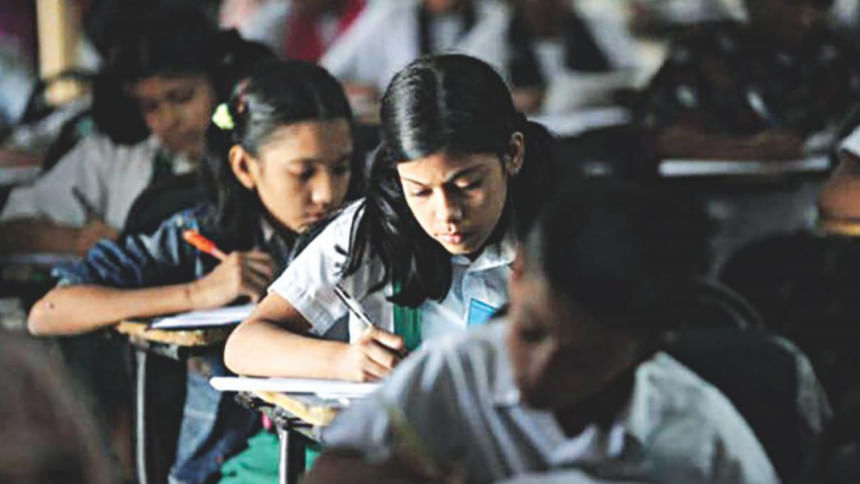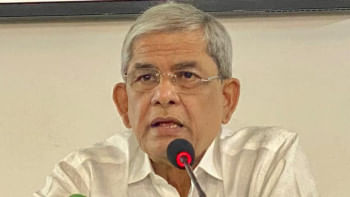Four priorities of the education agenda

If over the next two decades Bangladesh is to maintain its impressive 6-plus percent annual GDP growth, special policy level attention must be given to educational investment. Higher spending and better accountability of education officials for good management and results should be the focus—and four priorities must be on the education agenda.
First, the government should consider spending on universal education as an investment instead of treating schools as cost centres. Recent experience from the Delhi's Legislative Assembly election and the stunning victory of the Aam Admi Party (AAP), defying the political tide, demonstrates that higher spending in public education combined with good school management pays off. It has resulted in better learning outcomes, higher student attendance and improved school infrastructures, which earned the APP political credits. This is a lesson worth noting for Bangladesh.
Second, all providers of primary and secondary education—public, non-state and private—should focus on student learning outcomes, not just enrolment, dropouts and completion. Great strides have been made in Bangladesh in bringing children including girls into schools. A National Student Assessment (NSA) is undertaken every two years on a nationwide sample of grade three and five students and schools by the Directorate of Primary Education. NSA measures student learning in Bangla (the first language) and arithmetic against basic skills specified in the curriculum. NSA showed that more than half of class three and class five students did not perform at grade level in Bangla and arithmetic. In other words, after five years of primary education, the majority of students do not acquire literacy and numeracy at a functional level, handicapping them for further education or vocational skill training.
Education researchers and academics suggest two measures to help children achieve the essential competencies specified in the curriculum: i) Attract and retain enough capable teachers in the system and support and motivate them to perform in classrooms according to set performance standards; and ii) Discontinue the present high stake, nationwide public examinations at the end of grade five and eight which push students to memorise guidebooks and spend time and money on private tutors—and force teachers and parents to aid and abet this distortion of learning.
Testing is not a substitute for good teaching. School-based formative assessment of learners should be emphasised. The assessment of system, school and teacher performance can be better done through an adaptation of the NSA approach, without putting young children in tough competition with their peers.
Third, Bangladesh should consider joining OECD's Programme for International Student Assessment for Development (PISA-D). It is a pilot project that aims to make cross-country assessment more accessible and relevant to a wider range of countries. PISA measures key knowledge and skills that are essential to function in modern societies across countries.
In today's global world, Bangladesh has to compete in the world market and be at par in skills and competencies with other countries. Up to 700,000 young workers, almost half of all new entrants to the workforce every year, go abroad as migrant workers. These individuals as well as those staying at home must acquire the skills and capabilities necessary to adapt to the changing needs of the global market.
Cambodia, a country facing quality issues similar to Bangladesh, has joined PISA-D in its bid to improve student learning and assessment capacity. Its focus is on equipping young learners with 21st century skills that are in demand globally. Cambodia is being assisted by UNICEF-sponsored Southeast Asia Programme on Learning Metric (SEA-PLM). Bangladesh can benefit greatly by joining PISA-D.
Fourth, school level education planning, budgets, governance and management need to move progressively towards meaningful decentralisation and devolution of authority, where accountability lies with district, upazila and individual institutions. No other education system with the size and scale of Bangladesh—with 40 million students, a million teachers and 200,000 institutions—is run in such a top-down way as it is done here. The decisions that should be taken by the schools or local education authorities are often taken in Dhaka—frequently the buck is even passed onto the highest level of the government.
Schools of the 21st century must be responsive and adaptive to the diverse needs and circumstances of students all across the country. Given that Bangladesh wants to join the rich countries club by 2041, it needs to pursue these four strategic steps.
Mohammad Shahidul Islam is an education policy researcher at the University of Toronto, and former Senior Education Adviser of USAID in Bangladesh and Afghanistan.

 For all latest news, follow The Daily Star's Google News channel.
For all latest news, follow The Daily Star's Google News channel. 



Comments